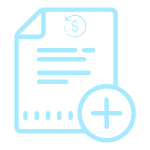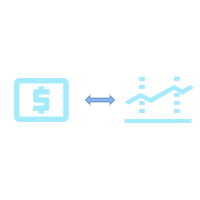Contents
When talking about investing and trading, there are two main marketplaces that everyone thinks of. The foreign exchange, which is also known as the Forex and stock markets are the most popular financial markets worldwide. For example, Forex alone accounted about $7 trillion in average traded value in a day in 2019. In today’s world, investors have a big number of trading instruments, so there can be an endless discussion about which one you must choose. Before we get into that, let’s get clear about the main differences.
Forex is a marketplace, where you buy and sell currencies, while the stock market offers shares – the units of ownership in different kinds of companies. While most countries have their own currency, the value is different in relation to one another. The goal of Forex traders is to buy a currency that is underrated at the moment, so you can sell it later when the value rises. Like currencies, the price of stocks changes all the time, it can change several times in a day, week, or month. Some of the best shares are companies with a good reputation, management, and market capitalization, for example, Apple and Amazon. At first glance, the choice is simple and maybe depended on which asset you are interested in trading, but there are a lot of other things to consider before choosing the best.
The first thing can be the trader’s risk tolerance. The common view is that the stock market has investors who have long-term goals and are less risky, while investors with short-term goals prefer Forex where the trading style is slightly different.
Trading Hours
 One of the main things to reflect on can be trading hours. The Forex market is open 24 hours a day, on weekdays, while the stock market has a timetable, depending on which region you are in. For example, New York opens at 08:00 and closes at 17:00, while Sydney opens at 17:00 and closes at 2:00. If you don’t live in the United States, it might be hard for you to trade during the most popular parts of the day. The Forex market gives you more time to trade but also creates a risk that you might not be at the right place at the right time. If you are a Forex trader, it means that you have time and risk management strategies, in order to protect yourself from undesirable losses. The most active time for Forex is when two different sessions overlap because there is a chance that a higher number of buyers and sellers will be presented. You can spend more time trading Forex as the hours are more flexible.
One of the main things to reflect on can be trading hours. The Forex market is open 24 hours a day, on weekdays, while the stock market has a timetable, depending on which region you are in. For example, New York opens at 08:00 and closes at 17:00, while Sydney opens at 17:00 and closes at 2:00. If you don’t live in the United States, it might be hard for you to trade during the most popular parts of the day. The Forex market gives you more time to trade but also creates a risk that you might not be at the right place at the right time. If you are a Forex trader, it means that you have time and risk management strategies, in order to protect yourself from undesirable losses. The most active time for Forex is when two different sessions overlap because there is a chance that a higher number of buyers and sellers will be presented. You can spend more time trading Forex as the hours are more flexible.
What Influences the Market?
Before you choose, you have to consider what influences the market prices. Like all the markets, they are both influenced by supply and demand, however, other components may impact the price. If you decide to trade a share you need to choose carefully. As we already mentioned, the company with a good reputation is a lot better. You also might have to look at their profits as in the long run, no company can survive without earnings. Sector health is also an important indicator, whether the company is able to deal with the competitors and conquer them all. With the Forex, you might have to wider the focus. As we talk about currencies, it means that you trade one for another and you have to think about not only one, but two countries’ macroeconomics. If you, for example, are interested in trading USD/AUD, it means that you have to look at the United States and Australia’s unemployment rate, inflation, GDP, and political situation. All of the above can have the biggest impact on the strength of the currency. In conclusion, trading Forex can be more interesting and complicated, but again, it depends on the trader’s interests and intentions.
The size of the market
Forex market offers more than three hundred currency pairs. It will be no surprise to say that most of the traders choose major currency pairs, such as USD, EUR, GPB, and JPY, as they are considered the most stable ones. Besides that, Forex has a massive daily trading volume, meaning, it sees about $5 trillion worth of trades per 1 day. Stock market opportunities can also be unlimited because you can trade within different industries, including technology, real estate, and automobile. Compared to Forex, which is the world’s largest exchange market, the stock market is remarkably small. Why can it be important? The great size of the market, makes liquidity go high.
The stock market has a regulated minimum balance to get started, while Forex does not require much. Considering the leverage, someone can get started with 100 dollars only.
Liquidity and Volatility
 If we have a high number of traders, it means that more money is circulating through the market. Forex traders always look for high liquidity because, in case of that, you can buy and sell the asset more quickly, without the price changing dramatically. As for the stock market, it can also be liquid but not in all cases. Popular stocks can be liquid because more people are willing to buy them, but once you decide to take a look at something else, the stock market generally becomes less liquid. Superior liquidity also means lower transaction costs.
If we have a high number of traders, it means that more money is circulating through the market. Forex traders always look for high liquidity because, in case of that, you can buy and sell the asset more quickly, without the price changing dramatically. As for the stock market, it can also be liquid but not in all cases. Popular stocks can be liquid because more people are willing to buy them, but once you decide to take a look at something else, the stock market generally becomes less liquid. Superior liquidity also means lower transaction costs.
Price fluctuation is also an important factor and that’s why volatility matters. A market that has high volatility tends to change prices quicker. High volatility is better for Forex traders, as in general, short-term strategies aim to make a profit from small price movements when you can either enter or exit trades in a shorter amount of time. However, long-term investors might not feel comfortable in a market that has a high volatility rate. Stock traders characterize as people whose strategy is to have a bigger profit in the distant future, short-term price fluctuations don’t mean much to them.
Do These Markets Correlate at All?
People always look for connections between different financial markets and Forex and stocks are no exception. It is known that these two markets have correlated in the past. For instance, while the global recession was happening in 2008, there was a trend between USD/JPY and Nikkei stock, called inverse correlation. As the price of Nikkei, which is a stock market index for the Tokyo stock exchange, declined, it was expected that the Japanese economy would weaken and in turn, USD would strengthen. In reverse, if the price of Nikkei increased, it would be expected for USD to weaken.
Allegedly, we can see that despite differences, such correlations can be found between these two markets, which gives the possibility to predict future price movements. However, prediction can be no guarantee of anything but still gives a man hope.
Regulations and Tax Treatment
 The stock market is well known for regulations and limits. While it can be disturbing for some people, it will give you a guarantee and protection to a degree that Forex does not. The stock market is regulated by U.S. Securities and Exchange Commission, which tells who can trade and when. If you don’t have more than $25,000 of a portfolio balance, you will not be able to place more than three trades a week. In terms of tax treatment, both of these are treated differently. If you are a Forex short-term trader, you may have lower taxes than a stock short-term trader. It is also worth mentioning, that trading Forex can make things a little confusing while managing taxes. A lot of people advise that Forex traders consider tax issues before getting started.
The stock market is well known for regulations and limits. While it can be disturbing for some people, it will give you a guarantee and protection to a degree that Forex does not. The stock market is regulated by U.S. Securities and Exchange Commission, which tells who can trade and when. If you don’t have more than $25,000 of a portfolio balance, you will not be able to place more than three trades a week. In terms of tax treatment, both of these are treated differently. If you are a Forex short-term trader, you may have lower taxes than a stock short-term trader. It is also worth mentioning, that trading Forex can make things a little confusing while managing taxes. A lot of people advise that Forex traders consider tax issues before getting started.
In short, debates are still going on between traders about which market is better. It’s clear that we don’t have the exact answer for that, because both of them have their pros and cons. The choice you make completely depends on you and your interests. It’s better to have a good technical analysis because it will clearly make your decision-making process easier. You can also consider your risk tolerance level because Forex increases both, risk and investment opportunities.

